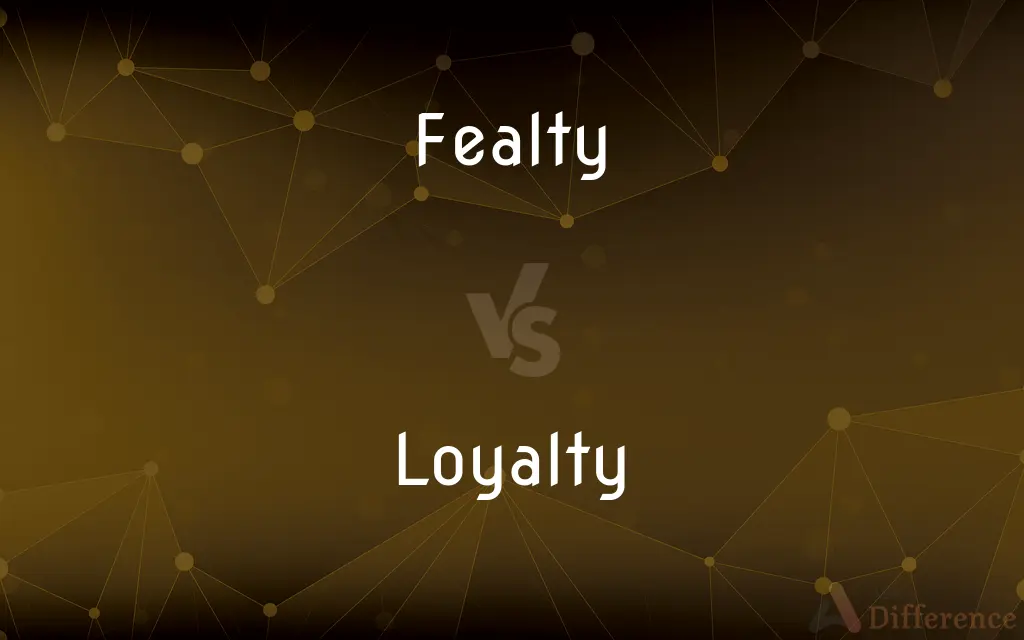Fealty vs. Loyalty — What's the Difference?
Edited by Tayyaba Rehman — By Urooj Arif — Updated on March 7, 2024
Fealty involves a formal, feudal allegiance, specifically to a lord, while loyalty is a broader, personal devotion to someone or something.

Difference Between Fealty and Loyalty
Table of Contents
ADVERTISEMENT
Key Differences
Fealty originates from the feudal system, binding a vassal to a lord with explicit obligations, while loyalty, a more general term, encompasses faithfulness to any entity, idea, or person.
Fealty, a legal and ethical bond stemming from medieval times, entails specific duties and rewards within a hierarchical structure, whereas loyalty can be found in diverse relationships, including friendship, family, and patriotism, without formal obligations.
While fealty is relatively rare and specific to certain contexts, loyalty is a universal concept, applicable across various aspects of life.
The practice of fealty has largely faded, remaining mostly in historical or ceremonial contexts, but loyalty remains a highly valued trait in personal, professional, and national relationships.
Comparison Chart
Definition
A feudal tenant's or vassal's sworn loyalty to a lord.
A strong feeling of support or allegiance.
ADVERTISEMENT
Origin
Medieval feudal systems.
Various, including family, friendship, and national identity.
Obligations
Specific, legal, and formal obligations to a lord.
Can be informal, personal, and vary widely.
Application
Historically specific to feudal relations.
Broad, applicable in many contexts including personal life.
Current Relevance
Mostly historical or ceremonial.
Highly relevant in personal, professional, and national contexts.
Compare with Definitions
Fealty
Sworn Allegiance.
Fealty was expressed through a ceremonial oath of loyalty to one's lord.
Loyalty
Broad Application.
Loyalty can apply to countries, ideals, or companies, not just individuals.
Fealty
Medieval Context.
In medieval Europe, fealty defined the relationship between a vassal and his lord.
Loyalty
Values and Beliefs.
Loyalty to an ideology involves a deep commitment to its principles.
Fealty
Legal Obligations.
The terms of fealty were often outlined in legal documents, detailing the vassal's duties.
Loyalty
Emotional Bond.
Loyalty is often driven by emotional connections rather than formal agreements.
Fealty
Feudal System.
Fealty was a cornerstone of the feudal system, structuring society hierarchically.
Loyalty
Personal Devotion.
Loyalty is seen in the unwavering support between close friends.
Fealty
Land and Protection.
Fealty involved the exchange of land for military service and protection.
Loyalty
Voluntary Allegiance.
Loyalty arises naturally and is not mandated by law or ceremony.
Fealty
An oath of fealty, from the Latin fidelitas (faithfulness), is a pledge of allegiance of one person to another.
Loyalty
Loyalty, in general use, is a devotion and faithfulness to a nation, cause, philosophy, country, group, or person. Philosophers disagree on what can be an object of loyalty, as some argue that loyalty is strictly interpersonal and only another human being can be the object of loyalty.
Fealty
A feudal tenant's or vassal's sworn loyalty to a lord
They owed fealty to the Earl rather than the King
Loyalty
The quality of being loyal
His extreme loyalty to the Crown
Fealty
The fidelity owed by a vassal to his feudal lord.
Loyalty
The state or quality of being loyal.
Fealty
The oath of such fidelity.
Loyalty
Often loyalties A feeling or attitude of devoted attachment and affection
My loyalties lie with my family.
Fealty
Allegiance.
Loyalty
The state of being loyal; fidelity.
Brand loyalty
Fealty
Fidelity to one's lord or master; the feudal obligation by which the tenant or vassal was bound to be faithful to his lord.
Loyalty
Faithfulness or devotion to some person, cause or nation.
He showed loyalty to his local football club after successive relegations.
Fealty
The oath by which this obligation was assumed.
Loyalty
The state or quality of being loyal; fidelity to a superior, or to duty, love, etc.
He had such loyalty to the king as the law required.
Not withstanding all the subtle baitWith which those Amazons his love still craved,To his one love his loyalty he saved.
Fealty
Fidelity to one's lord; the feudal obligation by which the tenant or vassal was bound to be faithful to his lord; the special oath by which this obligation was assumed; fidelity to a superior power, or to a government; loyality. It is no longer the practice to exact the performance of fealty, as a feudal obligation.
Loyalty
The quality of being loyal
Fealty
Fidelity; constancy; faithfulness, as of a friend to a friend, or of a wife to her husband.
He should maintain fealty to God.
Makes wicked lightnings of her eyes, and sapsThe fealty of our friends.
Swore fealty to the new government.
Loyalty
Feelings of allegiance
Fealty
The loyalty that citizens owe to their country (or subjects to their sovereign)
Loyalty
The act of binding yourself (intellectually or emotionally) to a course of action;
His long commitment to public service
They felt no loyalty to a losing team
Common Curiosities
How does loyalty differ from fealty?
Loyalty is a broader, more personal devotion not limited by legal or formal obligations.
What is fealty?
Fealty is a sworn allegiance, particularly in a feudal context, involving specific obligations.
Can loyalty exist without fealty?
Yes, loyalty can exist in many forms and relationships without the formal structure of fealty.
What are examples of loyalty?
Loyalty is evident in patriotism, friendships, family relationships, and support for brands or sports teams.
Is fealty still practiced today?
Fealty is mostly a historical concept, though its principles may inform some ceremonial or symbolic practices.
Can loyalty be detrimental?
Misplaced loyalty, such as to harmful ideologies or individuals, can be detrimental.
How is loyalty manifested?
Through actions, support, and advocacy for the object of one's loyalty.
How was fealty expressed in medieval times?
Through ceremonies where vassals swore oaths of allegiance to their lords.
What drives loyalty?
Emotional connections, shared values, and personal principles often drive loyalty.
Can a person be loyal without being faithful?
While loyalty and faithfulness are closely related, one can be loyal to a cause or group without adhering to all its principles strictly.
Are fealty and loyalty interchangeable?
No, due to fealty's specific historical and legal context, it's not interchangeable with the more general concept of loyalty.
Is loyalty a choice?
Yes, loyalty is a personal choice based on individual values and relationships.
Why is loyalty valued?
Loyalty fosters trust, stability, and mutual support in relationships and organizations.
Can loyalty change over time?
Yes, as individuals' relationships and beliefs evolve, their loyalties can also change.
Does fealty imply superiority and inferiority?
Yes, in the feudal system, fealty involved a hierarchy with lords having authority over vassals.
Share Your Discovery

Previous Comparison
Fun vs. Joy
Next Comparison
Nurturance vs. NurtureAuthor Spotlight
Written by
Urooj ArifUrooj is a skilled content writer at Ask Difference, known for her exceptional ability to simplify complex topics into engaging and informative content. With a passion for research and a flair for clear, concise writing, she consistently delivers articles that resonate with our diverse audience.
Edited by
Tayyaba RehmanTayyaba Rehman is a distinguished writer, currently serving as a primary contributor to askdifference.com. As a researcher in semantics and etymology, Tayyaba's passion for the complexity of languages and their distinctions has found a perfect home on the platform. Tayyaba delves into the intricacies of language, distinguishing between commonly confused words and phrases, thereby providing clarity for readers worldwide.














































